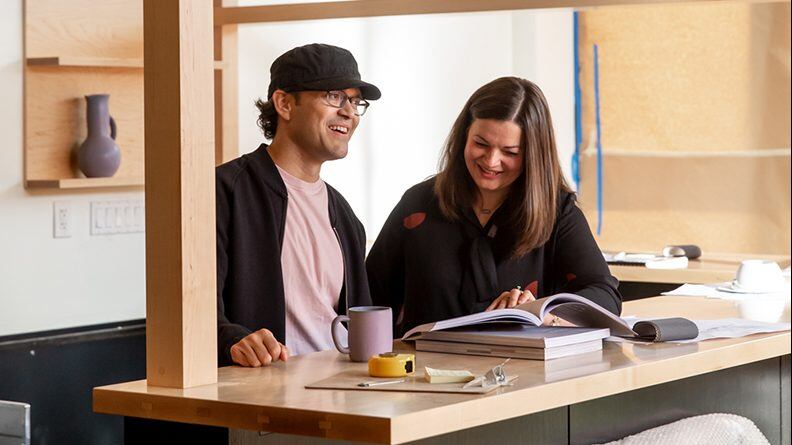At Ryan and Elena Roadhouse's new restaurant, Tonari, the intricate details stack up to form a singular tableau. The drastically remodeled former Accanto space—next door to the couple's seven-time James Beard Award-nominated omakase experience Nodoguro—is a visual delight from top to bottom. Created in collaboration with Japanese architectural firm Space Cruise, it's swathed in Japanese maple, living plant design, refurbished cherry wood, and Scandinavian lighting. The effect of walking through Tonari's doors is breathtaking.
And for the moment, that breath is being taken behind a mask.
"We've been asking ourselves, is this the right thing? Should we even be making food right now? There's no guidebook," says Elena Roadhouse. Opening a new restaurant is a challenging and singular experience in any timeline, but in 2020 there's no real precedent to draw from. The couple took over the space in early 2019, working a full year to remodel and reimagine the restaurant, adding a combined kitchen shared with Nodogoru next door and a custom sound system designed by Fred's Sound of Music on Hawthorne. "We were pushing to get open by early March," says Ryan Roadhouse, an opening date disrupted by COVID-19. "In a way, we were lucky—Tonari hadn't been defined yet."
As shutdowns swept the state and country, Nodoguro fans began reaching out via Instagram, wondering if takeout or bento might become available. Elena Roadhouse dived into sourcing sustainable, compostable takeaway packaging for to-go service, and Ryan Roadhouse began dreaming up menus. It wasn't long before they realized this might be the perfect opening format for Tonari, which was originally inspired by Okinawan cuisine and the couple's Peter Cat izakaya pop-ups.
Related: Nodoguro Slims Its High-End Japanese Tasting Menu Down to Bento Size.
"We have opened as a to-go spot," says Ryan Roadhouse, "designed to be born in a pandemic. In a strange way, it has been fun—this has been a great inspiration."
Tonari opened for takeout earlier this month, offering a broad range of options, from a subtly perfect smoked mackerel caesar salad to beautifully composed teishoku sets—a composed bento with sides, rice and choice of simple main protein. Originally envisioned as an all-day cafe with coffee and tea service, the menu items geared toward breakfast make for unexpected standouts, including a tofu parfait built on various forms of okara, a byproduct of the tofu-making process that, in Roadhouse's hands, is transformed into riffs on granola and meringue. The resulting dish is crunchy, creamy, fresh and utterly moreish. If and when such a thing as Portland brunch resumes, the parfait deserves ardent fans.
And then there's the seaweed: It envelops what has fast become one Tonari's singular dishes, and an obvious Instagram breakout star. It's called an onigirazu, a dish that first appeared in the long-running manga series Cooking Papa. It is not onigiri, nor musubi, nor the culinary portmanteau known as sushiritto, but perhaps a kissing cousin to them all.
At Tonari, the onigirazu functions as a ready-to-eat handheld answer to mankind's desire for nori, rice and toppings—a riff on the sushi paradigm Nodoguru is often mistaken for. It is a seaweed-wrapped rice pocket split in two, filled with three glorious flavor choices and presented with stunning simplicity, built for breakfast, lunch, or dinner.

THE SEAWEED
A chance meeting with representatives of Yamamotoyama, the Japanese green tea and seaweed company founded in 1690, created access to a limited quantity of rare, prized ariake, wild harvested seaweed from the Ariake Sea. "Nobody else serves it in Portland," says Ryan Roadhouse. "I have to place orders for it by the sheet." The seaweed is gorgeously textured, fragrant and complex, and holds together the onigirazu wrap without pulling or softening, making it the perfect adaptation of luxury and takeaway.
THE RICE
Roadhouse uses Sasanishiki rice, a varietal created in the Sendai province of Japan. "I like sour rice," he says, "with acidity that gives more of that sensation of eating sushi." To achieve it, the rice is seasoned with akasu red vinegar from Japan and arajio coarse sea salt.
THE FILLINGS
Currently, Tonari offers three filling choices, all very good, all very different. They include: smoked rainbow trout, thinly sliced cucumber, and a creamy sauce of masago, red onion, caper and black pepper "inspired by Japanese tartar sauce"; a combination of soft, sweet tamago egg omelet and Tails & Trotters Canadian bacon for "an Egg McMuffin kind of thing" that sounds perfect for Saturday morning at 10 am; and a vegan futomaki riff with pickled ginger, sesame, avocado, cucumber, poached carrots in sweet soy sauce and kanpyo.
EAT: Tonari, 2838 SE Belmont St., tonaripdx.com. Takeout only 4-6:30 pm Wednesday-Sunday.
